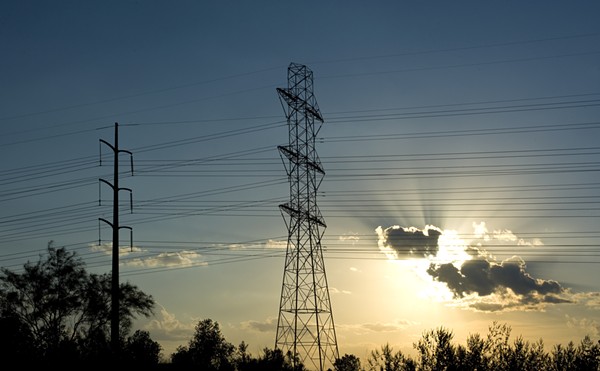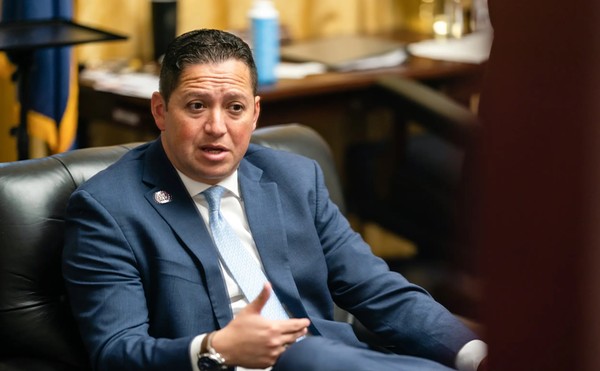But it's time for the dawning of an economic bonanza on the city's exploited and forgotten Southside - right?
Toyota Motor Corp. President Fujio Cho took the microphone during last week's group hug for chamber folks and big shot politicos at The University of Texas Institute of Texan Cultures, and explained why Toyota planners changed their reluctance to build a big pickup truck for the American market.
He said their colleagues in the United States took several Toyota planners to a Dallas Cowboys football game, and the visiting Japanese were impressed with the lineup of Fords and Chevys in the Texas Stadium parking lot. The popularity of the pickup was a point well taken, and Toyota developed the full-sized Tundra to compete in the lucrative market.
Cho confirmed that Toyota would invest $800 million and roll 150,000 Tundras off the line in 2006.
But he also introduced the Texans to the word "kaizen," which means continuous improvement. "Each of our new plants have included more environmental kaizens ... and we have some very exciting and innovative things planned for the San Antonio plant," Cho said.
That leads to a burning question as one munches a plate of sushi and fajita tacos: Will the Tundra feature innovative, fuel and atmosphere saving hybrid or fuel cell technology that Toyota has been developing in its Prius and other models?
"Our hybrid synergy drive is the second generation of hybrid technology," said John Hanson, national manager of product news for Toyota Motor Sales, "That system will go into the Lexus RX330 and
| The specs: gasoline vs. hybrid | |
| Toyota Prius Price: $20,000 and up Mileage: 45-52 mpg Power: Hybrid gasoline combined with electric | Toyota Tundra Price: $16,000 - $31,000 Mileage: 14-18 mpg Power: Gasoline |
Hanson said Toyota's target is to sell 300,000 hybrid autos worldwide by 2005, and the company is conducting a pilot program for fuel cell technology in Japan and in two cities in California.
Fuel cells convert fuel such as hydrogen into energy with no harmful emissions, and is a goal that Toyota and other auto manufacturers have on the horizon. President George Bush endorsed fuel cell technology and supporting infrastructures in a recent State of the Union address.
Why the seemingly slow progress, and no announcement that Tundras will be powered by fuel cells, since their impending production in San Antonio is three years away?
"The thing about fuel cell technology, building the vehicle is only part of the story," Hanson explained. "The other part is to create an infrastructure to refuel and service the vehicles." He said Toyota is working to develop fuel cell infrastructures in Irvine and Davis, California, to install service stations for fuel cell-powered autos. "You have to start somewhere. The development of fuel cell technology is ahead of development of the infrastructure. Fuel cell technology is extremely useful as a power source for buildings, but development of technology is fairly new."
Fuel cell technology, when compared to a technology such as television, is in the black-and-white screen stage of development, where only a few sets existed in a given town, and the neighbors would crowd into the living rooms of the privileged on Saturday nights.
But fuel cell technology could move along a little faster than television has done, considering the work of scientists at Southwest Research Institute. The entity has a contract with the U.S. Army to develop a Class A tractor-trailer rig powered by fuel cell technology that converts diesel fuel to power the truck without the devastating effects of harmful emissions.
"We are electrifying engine loads such as the air conditioning compressor, we will electrify the coolant system, the water pump, the radiator fan and a number of the other systems such as the power steering pump, systems which are a drag on the engine," said Joe Redfield, group leader for fuel cell systems at SWRI. "The reason we are doing this is `that` by electrifying the loads, we can increase the efficiency of the overall energy conversion of the system and get better fuel economy."
Redfield said the goal is to have a truck that has fuel cell technology to produce electricity that not only powers the truck, but also can be used to produce electricity on the battlefield without towing cumbersome generators to the site. He pointed out that such technology can benefit the commercial truck and ultimately, the auto industry.
Given that SWRI is working on such projects and the fact that Toyota is a leader in the development of alternative fuels, perhaps the Tundra some day would roll off the production floor, complete with an electric engine that is powered by the same fuel cell technology that turns on the lights and heats the water in your house. •


















